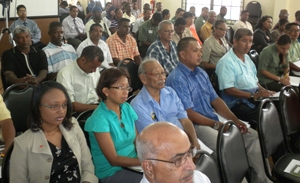NEWS: Guyana, EU start negotiations for major accord against illegal timber harvesting
Georgetown, GUYANA,  23 April 2012/ KNews: Guyana has started negotiations with the European Union (EU) for a major accord that will ensure only legally harvested timber enters that market. The Voluntary Partnership Agreement (VPA), once signed, will see increased monitoring to ensure that timber harvesting is in keeping with international standards.
23 April 2012/ KNews: Guyana has started negotiations with the European Union (EU) for a major accord that will ensure only legally harvested timber enters that market. The Voluntary Partnership Agreement (VPA), once signed, will see increased monitoring to ensure that timber harvesting is in keeping with international standards.
The EU-FLEGT (Forest Law Enforcement, Governance and Trade) Agreement will allow access to technical and other help to improve the current processes of monitoring in the country.
During the launching of the African, Caribbean and Pacific (ACP Group) FLEGT Support Programme on Wednesday at the Kingston offices of the Guyana Forestry Commission, Minister of Natural Resources and the Environment, Robert Persaud, disclosed that Guyana is currently working to modernize, yet again, its National Log Export Policy, to reflect changes in recent times.
The EU is contending that illegal logging has a devastating impact on some of the world’s most valuable forests – it can have not only serious environmental, but also economic and social consequences. The FLEGT Action plan is effectively the solution to the problem. It provides a number of measures to exclude illegal timber from markets, to improve the supply of legal timber and to increase the demand for responsible wood products.
A central element of the EU’s strategy to combat illegal logging are trade accords with timber-exporting countries, known as VPAs, to ensure legal timber trade and support good forest governance in the partner countries. As a second element, the EU created legislation to ban illegally-produced wood products from the EU market, known as the EU Timber Regulation.
According to Persaud, Guyana is moving ahead with commencing formal dialogue with the EU with the aim of signing the VPA. This would come at a time when a new National Log Export Policy is about to be instituted.
Assisting Guyana in joining up with the EU on the programme is the United Nations Food and Agriculture Organisation (FAO).
According to the Minister, several community forestry organizations involved in logging have expressed interest in the programme. Already, consultations have been held in this regard.
Persaud stressed that the management and development of national resources is critical to wider development plans of Guyana and to enhance forest legality, governance and overall development.
He also pointed out that despite intensified monitoring there has not been a slowdown in forestry activities or an immediate lack of interest. This, he noted, is evidenced from the average output of 400,000 cubic metres per annum average, with earnings for the sector at an average US$40-50M annually.
Forestry activities not only support large companies but also numerous hinterland communities, with close to 20,000 persons directly and indirectly benefiting. The livelihood of many indigenous people also cannot be ignored, he said.
Persaud admitted that it had been a challenge to deal with the many issues, including the likes of mining. In the midst of this, Guyana has managed to maintain a sustainable rate of low deforestation or a reduction of forest degradation.
This, he stressed, did not happen by chance. Rather, Guyana has had to constantly review its legislative framework and its national forest plan.
The EU-FLEGT agreement will initially see the monitoring of approximately 55 areas. Persaud insisted that the idea was to further improve transparency and ensure that the stewardship of the forest meets international standards.
EU Ambassador Robert Kopecký, who was also present at the launching, noted that Europe remains one of the biggest customers globally. He pointed out that with the world looking more for green and sustainable policies, the issue of illegal harvesting remains an issue.
And the FAO’s Representative to Guyana, Lystra Fletcher-Paul, asserted that illegal harvesting accounts for around US$10B in revenue losses for governments.
The EU-FLEGT programme will allow for third party verifications, she disclosed.
In recent years, there have been instances of illegal harvesting, with several prominent companies being fined almost $300M for infringements.
(Pictured: Stakeholders at the EU-FLEGT launch event in Guyana/ KNews)
– KNews
